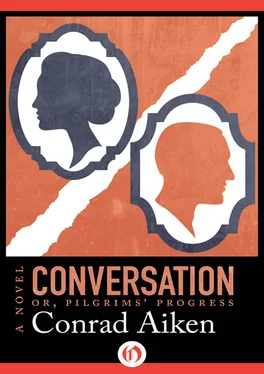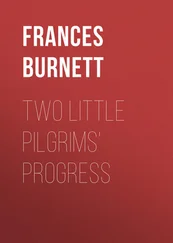“Van Gogh,” he said aloud, “my hat !”
The church clock was striking — Terence’s blue wagon rattled past along the street, Terence standing upright in it, the reins easily held, like a charioteer — old Mr. Fosdick, the town librarian, trudged by on his way to the library, an apple in his hand — thinking no doubt of his lost career in Rio de Janeiro, the twenty years sacrificed for nothing, looking after a shiftless bedridden brother — the phonograph in the Puringtons’ squawked its “In between-time, in the meantime” for the thousandth time, and then was silent, for the resumed dripping of the fog from the trees — it was all hopeless.
When at last the hall door opened, with its two-toned squeak, and Enid, still calm and implacable, asked him, in the blandest of voices, “Well, have you made up your mind?” he could stand it no longer. He merely said, over his shoulder, putting as much venom into it as he could possibly concentrate:
“Will you please get out ?”
It was like a new voice between them. Nothing like this had ever happened to them before. And in the second before she turned, he saw in her eyes, her mouth, her whole face, even in the queer gesture of her hand on the glass doorknob, a something new and unknown, something hurt, which he had never yet seen there. It was as if a gulf had opened between them, and as if she had become a stranger.
“… The houses were made with long young sappling trees, bended, and both ends stuck into the ground. They were made round, like unto an arbour, and covered down to the ground with thick and well wrought mats, and the door was not over a yard high, made of a mat to open. The chimney was a wide hole in the top, for which they had a mat to cover it close when they pleased. One might stand and go upright in them. In the midst of them were four little trunches, knocked into the ground, and small sticks laid over, on which they hung their pots, and what they had to seethe. Round about the fire they lay on mats, which are their beds.… In the houses we found wooden bowls, trays, and dishes; earthen pots; hand baskets, made of crab shells, wrought together; also, an English pail or bucket, it wanted a bayle, but it had two iron ears. There was also baskets of sundry sorts, bigger and some lesser, finer and some coarser; some were curiously wrought with black and white, in pretty works, and sundry other of their household stuff.… There was also a company of deer’s feet stuck up in the houses, hart’s horns, and eagle’s claws, and sundry such like things there was; also, two or three baskets full of parched acorns, pieces of fish, and a piece of a broiled herring.… Having thus discovered this place, it was controversial amongst us what to do touching our abode and settling there. Some thought it best, for many reasons, to abide there.…”
— JOURNAL OF THE PILGRIMS
“I’m going out,” he said into the darkened room, through the half-opened door. “I’m going over to Jim Connor’s. To deliver your tender message.”
She made no answer. She was lying on her bed again, this time with her elbows raised, her hands above her head on the pillow, and her eyes (though in the obscure light he couldn’t be sure) turned up towards the sloping ceiling. Was there a handkerchief in one of her hands? Had she been crying?
“Did you hear me?” he said.
“Yes, I heard you.”
Her voice was averted, flat, stifled. She hadn’t moved.
“All right. And I don’t know when I’ll be back. If they should ask me to stay for supper, I think perhaps I will —just this once!”
He waited a moment for an answer, leaning against the doorjamb, but, as he got none, he went slowly down the stairs, through the studio, and into the tiny entry hall, where he took his oilskin hat and slicker from the wooden peg.
Ratio Binney’s chuckle of thunder — it was a murmur, rather — for a second time ran softly from the southwest round the sky, a continuous but stumbling sound; and when he stepped out into the street he found that it had already begun to rain a little — a drizzle so gentle, however, that its sound, even on the heaped leaves, was barely audible. The afternoon was no brighter, for if the fog had at last really lifted, the clouds had taken its place. The omens were all for a soft, settled rain, an all-nighter — in some ways the best of Cape weather. It would be good for the lilacs, bed the roots down, wash off the sand. They would settle, take their permanent place in the garden, their permanent place in the earth, and get themselves ready for the spring.
The spring! But would there be such a thing as spring?
He shut his teeth bitterly on the unspoken phrase, as if indeed he were biting the words, biting them to shreds, and walked slowly, unseeing, or only automatically seeing, past the white house, the red house, the house with the cupola; the house with the little cement-lined garden pool; the cottage with the catalpa tree (now naked) and the painted swing. Deserted, autumnal, resigned — the deserted village. The Scudders’ windmill yawed and moaned, a sad minor note, on top of its red wooden tower; he looked up at it and away, kicking the sodden leaves on the path — in no time at all it would be winter, there would be snow. Catching the early train, too, on pitch-dark mornings, Mr. Murphy coming over with a lantern to ring the doorbell, shout up at the window — standing there with his lantern in the snow, the collar of his sheepskin coat turned up, wearing a cap with earmuffs. And then, at the forlorn little station in the woods, the brightly lighted train coming slowly round the bend, its voice crying mournfully over the frozen trees, the bell clanging and steam hissing as it stopped by the frost-rimed unlighted boards of the platform: the dirty little train with its early morning card-players, heavy-eyed businessmen, high-school children on their way to school, and the Boston papers. Crawling through the winter morning twilight to Boston, to the gray slush-filled streets of Boston, the subway, the smelly crowds, and the everlasting school, the Frazer School of Fine and Applied Arts. Another winter of it, another year of it, the time for his own work always becoming shorter, perhaps at last vanishing entirely. Good god, what a vision.
“If you can’t do it with your eye, use a plumb line.”
“Miss Shea, why will you try to fill up every corner with extraneous objects?”
“Fine feeling for form and rhythm in that one, yes, but look — the color is so heavy it kills it.”
“My dear girl, exaggerate only for emphasis. Won’t you try to remember that?”
“All right now. Jump your eye down from the shoulder blade to the patella. You can see then how much your figure is out of balance. If you can’t draw, Miss Casani, how in god’s name do you expect to paint? Draw with the brush, draw with the brush.”
“Retouching varnish might help some of those dead spots, but remember you can’t paint a picture with nothing but varnish!”
“Empathy, empathy, empathy—”
“Miss Bloom, that brush of yours needs a shave. Can’t you see what it’s doing? Try a razor blade on it, cut those crooked hairs off.”
“And for goodness’ sake, hold your brush as if it were something more than the stub of a pencil!”
The dreadful roundelay of trite phrases, over and over again, day after day — plastic form, linear perspective, volume, weight, mass, tone — solidity, color-rhythm, luminosity, the Chinese vertical perspective — kinetic, static, calligrapher — balance, proportion — in Christ’s name, when you got right down to it, what the devil did they all mean? A pitiful pettifogging dishevelment of a process which must be a process, and an instinctive and automatic one, a fluid and unanalyzed action, or nothing. Paint, on a square of canvas — or a vision, which had somehow extended itself through the hand. And in between, the muddied sty of the teacher.
Читать дальше












